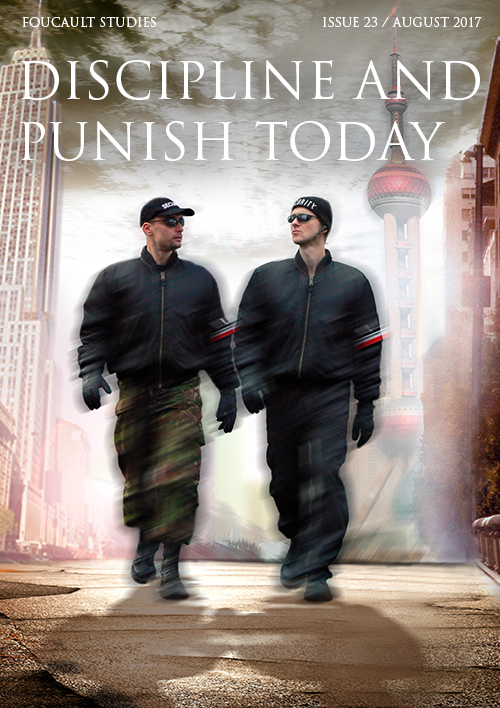The Inverted Eye. Panopticon and Panopticism, Revisited
DOI:
https://doi.org/10.22439/fs.v0i0.5341Keywords:
Panopticism, power, examination, subjectification, digital technologiesAbstract
Panopticism is commonly taken to rely on something like a panoptic gaze – a reading of Foucault which still prevails in the discussion of today’s surveillance (and subjectification) technologies in the wake of Surveiller et punir. In my re-reading of the relevant chapters of Foucault’s book I argue that the gaze does not occupy a central role in the techniques of discipline and power that Foucault describes. Quite to the contrary, Foucault analyses virtualization and automatization procedures that – after cutting off of the King’s head – invert and eliminate the sovereignty of the gaze as well: they also rip out the sovereign’s eye. Surveiller et punir thus should be read as a book about a certain eyelessness of the modern political. Where truly modern power is assumed to be, there is nothing to be seen. This also means that panopticism does not provide a master key to understand digital technologies of power.
References
Castel, Robert. 1991. “From dangerousness to risk”, in: Graham Burchell, Colin Gordon, Peter Miller (Eds.): The Foucault Effect. Studies in Governmentality. Chicago: University of Chicago Press, 281-298.
Deleuze, Gilles. 1986. Foucault. Paris: Minuit.
Foucault, Michel. 1975. Surveiller et punir. Naissance de la prison. Paris: Gallimard.
Foucault, Michel. 1976. Überwachen und Strafen. Die Geburt des Gefängnisses, trans. by Walter Seitter. Frankfurt am Main: Suhrkamp
Foucault, Michel. 1977. Discipline and Punish. The Birth of the Prison, trans. by Alan Sheridan. London: Allen Lane.
Foucault, Michel. 1999. Les Anormaux. Cours au Collège de France, 1974-1975. Paris: Seuil/Gallimard.
Gelhard, Andreas. 2012. “Das Dispositiv der Eignung: Elemente einer Geschichte der Prüfungstechniken”. In: Zeitschrift für Medien- und Kulturforschung, Nr. 1, 44–60.
Gelhard, Andreas. 2014. “Entgrenzung der Psychotechnik: Der neue Geist des Kapitalismus und das Problem der Prüfungstechniken“, in: Andreas Kaminski and Andreas Gelhard (eds.): Zur Philosophie informeller Technisierung. Wissenschaftliche Buchgesellschaft, Darmstadt, 185-203.
Gehring, Petra. 2013. “Eine Topo-Technologie der Gefährlichkeit. Digitale Einsperrtechniken und sozialer Raum“. In: Andreas Gelhard, Thomas Alkemeyer, Norbert Ricken (Hg.), Techniken der Subjektivierung. München: Fink, 299–314.
Kaminski, Andreas. 2014. “Maßstäbe der Macht. Psychologische Prüfungen als Techniken des Selbst“. In: Andreas Kaminski and Andreas Gelhard (eds.): Zur Philosophie der informellen Technisierung. Darmstadt: Wissenschaftliche Buchgesellschaft, 171-184.
Levin, David Michael. 1997. Keeping Foucault and Derrida in Sight: Panopticism and the Politics of Subversion. In: David Michael Levin (Ed.): Sites of Vision. The Discursive Construction of Sight in the History of Philosophy. Cambridge: MIT Press, 397-465,
Lyon, David. 2002. “Editorial. Understanding visibility, mobility and the phonetic fix”, in: Surveillance & Society 1, 1-7.
Niesen, Peter. 2008. “Die Macht der Publizität”, in: Ralf Krause, Marc Rölli (eds.): Macht. Begriff und Wirkung in der politischen Philosophie der Gegenwart. Bielefeld: transcript, 221-244.
Simon, Bart. 2005. “The Return of Panopticism”, in: Surveillance & Society 3, 1-20.
Virchow, Rudolf. 1862. “Atome und Individuen” (1859). In: Vier Reden über Leben und Kranksein. Berlin: Georg Reimer, 35-76.
Downloads
Published
How to Cite
Issue
Section
License
Authors retain copyright to their work, but assign the right of the first publication to Foucault Studies. The work is subject to a CC BY-NC-ND 4.0 license, but despite these restrictions, authors can take for granted that Foucault Studies will permit articles published in Foucault Studies to be translated or reprinted in another format such as a book providing a full reference is made to Foucault Studies as the original place of publication.



